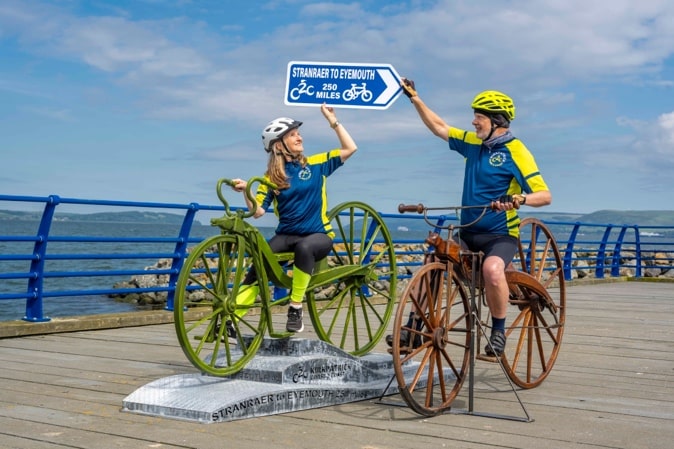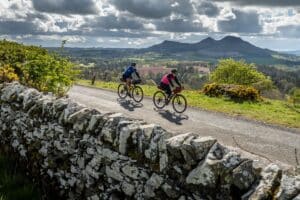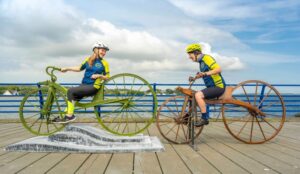
A striking new interactive sculpture of the world’s first pedal bicycle has been installed on the West Pier in Stranraer at the official start point of a major cycle route – the Kirkpatrick C2C: South of Scotland’s Coast to Coast.
250 mile coast to coast route
The awe-inspiring route is 250 miles – making it one of the longest coast to coast cycle routes in the UK – and ends in Eyemouth, where another eye-catching artwork has been installed to mark the finish line.
Funded by South of Scotland Enterprise, the eye-catching sculpture was created by local blacksmith brothers Finn and Sam Barlow, who won the tender late last year.

Janet Jones from Creative Stranraer on the sculpture marking the start of the Kirkpatrick C2C.
Measuring 4ft tall and 4ft wide, it is made of steel and weighs 300kg. The £14,500 piece took three months to design and build in the Barlow brothers’ workshop in Auchencairn, near Castle Douglas.
Representing the first pedal-powered bicycle – known as the velocipede and invented by Dumfriesshire blacksmith Kirkpatrick Macmillan in 1839 – the sculpture is life-sized and designed to bear weight, meaning cyclists about to attempt the route can mark the occasion with a photo of them sitting atop the representation of the first pedal bicycle.
Kirkpatrick Macmillan inspiration
The brothers paid homage to Kirkpatrick Macmillan through more than just the form of the sculpture, choosing to approach the project as the famous blacksmith would have by combining traditional blacksmithing skills with innovative design.
Meanwhile, at the other end of the Kirkpatrick C2C, on the Berwickshire Coast, a new artwork has been installed at Eyemouth Harbour marking the end point of the route – or the start point, depending which direction cyclists tackle it!
Unveiled last summer, the fully signposted Kirkpatrick C2C route is already proving to be a huge draw for the South of Scotland. Early projections prior to its July 2023 soft launch suggested the new route could attract up to 175,000 new visitors to the region, with a direct spend of £13.7M per year.

Cyclists on the Kirkpatrick C2C in the Scottish Borders.
For cyclists who want a challenge, the Kirkpatrick C2C can be tackled over four days, while the slower Explorer Route allows riders to immerse themselves in the beauty, heritage and charm of the South of Scotland, spending eight days completing the route from Stranraer to Eyemouth with plenty of places to stay, visit, eat and drink along the way.
Route development partners
The development of the route has been led by South of Scotland Enterprise alongside Dumfries and Galloway and Scottish Borders councils, South of Scotland Destination Alliance, VisitScotland and Sustrans.
Professor Russel Griggs, Chair of South of Scotland Enterprise, said: “We are delighted to have funded the interactive sculpture, created by local blacksmith brothers, to mark the start of the Kirkpatrick C2C, South of Scotland’s Coast to Coast cycling route.
“SOSE has helped, alongside partners, to develop this fantastic cycling route which showcases some of the most beautiful sea views and picturesque towns across the South of Scotland.
“Cycling continues to offer significant social, economic and environmental opportunities to the region, and our long-term aim is to make the South the leading cycling destination in Scotland by 2032.”
Councillor Ian Carruthers, Chair of Dumfries and Galloway Council’s Economy and Resources committee said: “The Kirkpatrick C2C is a great addition to our region’s long-distance routes. As one of the UK’s longest coast to coast routes and taking in the best wild scenery the South of Scotland has to offer, it’s sure to be a challenge many will be keen to take.”
Councillor David Inglis, Vice Chair of Economy and Resources committee added: “It is fitting that this sculpture has been created by the Barlow brothers – blacksmiths based in Dumfries and Galloway, as was Kirkpatrick Macmillan. The new interactive sculpture of Kirkpatrick Macmillan’s velocipede will give residents and visitors the chance to experience this important invention.”

David Hope-Jones, CEO SSDA
Chief Executive of the South of Scotland Destination Alliance, David Hope-Jones, said: “Created, fittingly, by innovative Auchencairn blacksmith brothers Finn and Sam Barlow, this remarkable representation of the first pedal-powered bicycle is truly evocative of the spirit of Kirkpatrick Macmillan, a blacksmith and inventor himself.
“What better way to mark the start of this fantastic new coast to coast cycling route, which takes cyclists on an unforgettable journey through the breath-taking landscapes of Dumfries & Galloway’s dramatic coastlines and rolling hills before reaching the romantic ruined abbeys and striking Victorian viaducts of the Scottish Borders, with plenty of brilliant places stay, eat and drink along the way.”
Janet Jones, Art and Engagement Officer at Creative Stranraer, said: “It’s brilliant for Stranraer having the fabulous new coast to coast cycle route starting in the town, it really puts it on the map for a whole new audience of potential visitors. Creative Stranraer was thrilled to get involved in this public art project to mark the route’s official start point and the Barlow brothers have absolutely knocked it out the park with their magnificent tribute in steel to Kirkpatrick Macmillan’s world-changing invention.
“We hope it will inspire locals of all ages to also embrace cycling in the town and all the benefits it brings and take pride in the route starting here. We will celebrate cycling locally on 22 June, from 11-1pm at Agnew Park – come along and join the fun!”

Janet Jones from Creative Stranraer on the newly installed sculpture, with keen local cyclist Phil Wright pictured on a wooden replica of the original Kirkpatrick Macmillan pedal cycle, courtesy of Dumfries Museum.
Creators of the new sculpture, blacksmith brothers Finn and Sam Barlow, said:
“In researching this project we instinctively recognised the employment of craft skill and technological innovation which brought about the genesis of the original Kirkpatrick Velocipede. We approached our project in a similar manner, combining today’s methods of CAD design and laser cutting with traditional Blacksmithing techniques to produce a viable replica of the world’s first treadle bicycle. We also built in various aspects to meet the brief as a robust and ergonomic piece of public sculpture.
“We hope that many people of all ages will interact with the piece, using their eyes and bodies to understand how the velocipede works and why it was such an important milestone in the development of human powered transport. Maybe they will be inspired to cycle some of the same roads that Kirkpatrick Macmillan used to test out his marvellous machine.”



